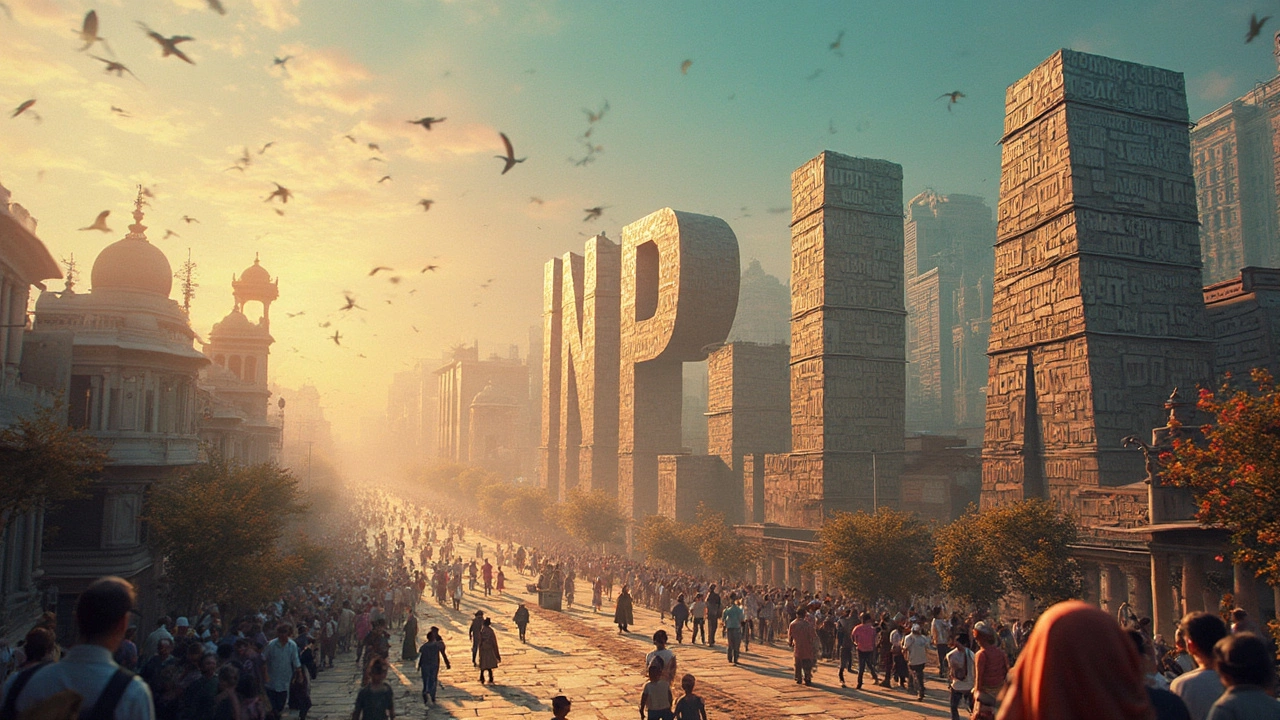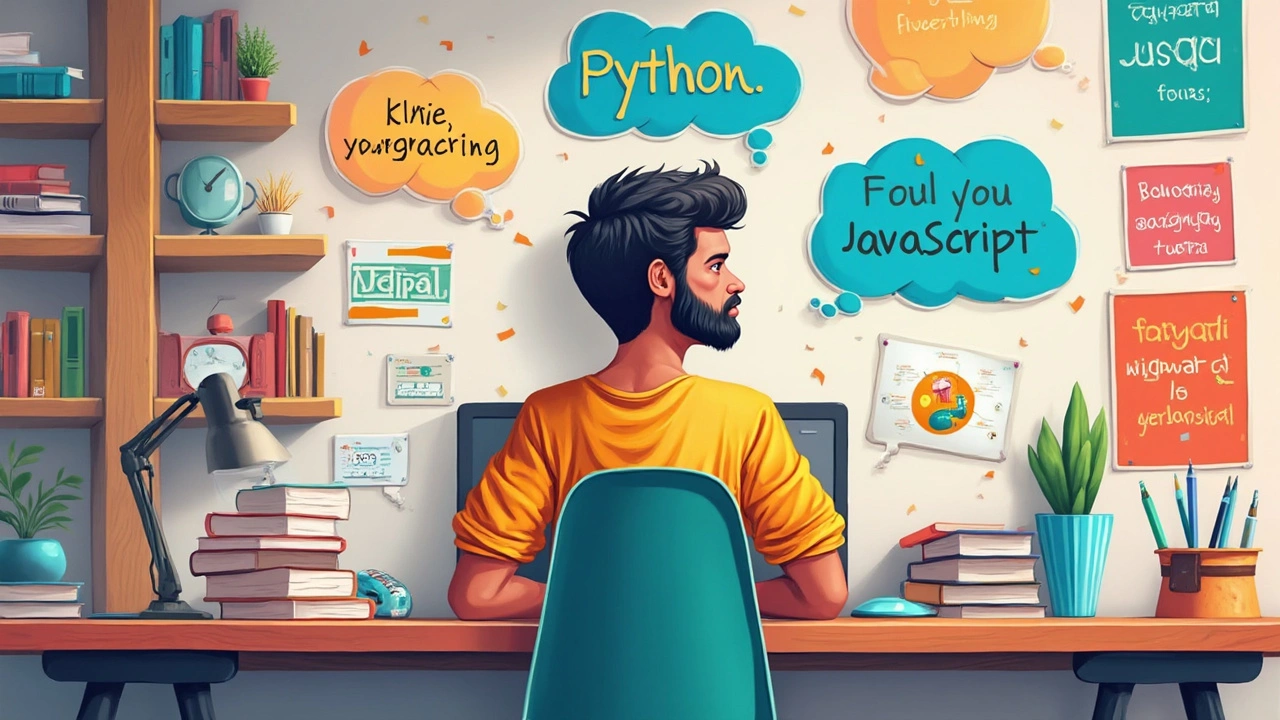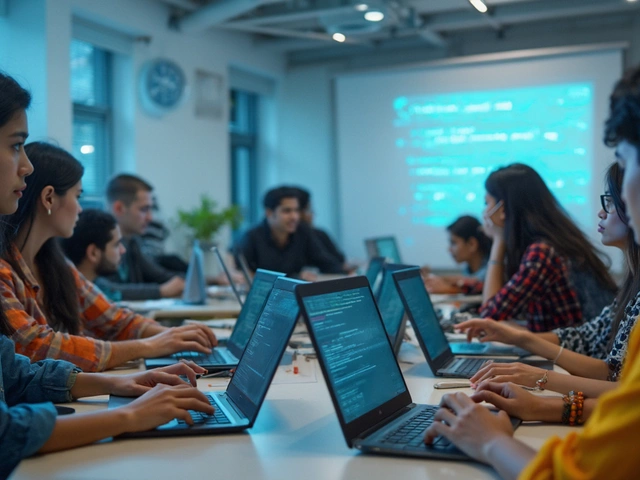If you're dipping your toes into coding, the first big question is: Which language should you start with? Sure, there are tons of options out there, and it can be a bit overwhelming. But don’t worry; we’ve got the lowdown right here.
To kick things off, let's talk about why picking the right language is kind of a big deal. It's like choosing a first bike—you want something that’s not only easy to handle but also supports you as you grow. The same goes for coding; the language you start with can shape your learning experience.
Many newbie coders find themselves leaning towards Python. Why? Well, it’s simple—both in syntax and flexibility. Python reads a lot like English, which makes it a breeze for beginners to grasp. Plus, it's super versatile. From web development to AI, Python's got your back.
- Why Choosing the Right Language Matters
- Python: The Friendly Giant of Programming
- JavaScript: The Web's Essential Language
- Scratch: Coding for Absolute Beginners
- Practical Tips for Beginners
Why Choosing the Right Language Matters
Picking the right coding language at the start is crucial. It's not just about what's popular or trendy; it's about what's practical for you as someone new to programming. The right language can make learning smoother and help you stay motivated.
Factors to Consider
First off, think about your goals. Are you looking to build websites? Create apps? Or maybe you're interested in data science? Your end goal can influence which language you should dive into first. For example, if web development is your thing, JavaScript is a must-learn because it's the backbone of web development. On the other hand, if you're fascinated by data analysis, well, Python has got plenty of libraries like Pandas and NumPy that are perfect for that.
Ease of Learning
Another key point is how newbie-friendly the language is. Languages like Python are known for an easy, readable syntax and have extensive community support. This makes Python super approachable for newbies because you’re not spending all your time Googling error messages or complex syntax rules.
Community Support and Resources
The strength of the community matters too. A strong community means plenty of free tutorials, forums and problem solutions are available. Languages like Python and JavaScript have massive communities, so there's a ton of help for when you get stuck, which you likely will as you start—you’re human after all!
Here's a simple snapshot of beginner-friendly languages based on various factors:
| Language | Best For | Ease of Learning |
|---|---|---|
| Python | General purpose, Data Science | Very Easy |
| JavaScript | Web Development | Moderate |
| Scratch | Absolute Beginners | Very Easy |
In the end, the best language for beginners often boils down to what fits your personal learning style and objectives. Try a few and see what clicks for you!
Python: The Friendly Giant of Programming
Dipping into coding for the first time? Meet Python—the language that’s quickly become the go-to for many beginners. Why's that? Let’s break it down.
First off, Python is renowned for its simplicity. The syntax is straightforward and reads almost like English, making coding less intimidating. Need to print 'Hello, World!'? Simply type print("Hello, World!"). No complicated symbols or structure to sift through—just clear and concise.
Why Python Rocks for Beginners
Aside from being easy to read, Python is mighty versatile. It's the Swiss army knife of programming languages, used for web development, data analysis, artificial intelligence, and more.
- Web Development: Frameworks like Django make it a breeze.
- Data Science: Libraries like Pandas and NumPy are user-friendly and powerful.
- Machine Learning: Tools like TensorFlow fuel many AI projects.
Considering career prospects? Python's demand is soaring—particularly in fields like AI and web development. Companies everywhere are looking for Python pros.
Python’s Growing Popularity
Let’s look at some numbers:
| Year | Python Developer Jobs |
|---|---|
| 2019 | 300,000 |
| 2023 | 600,000 |
And these stats keep climbing as the technology world embraces Python more each year.
Beyond Basics: Where Python Can Take You
Once you're comfortable with the basics, Python offers tons of pathways to explore. Whether you dive into building web apps, analyzing huge data sets, or even making games, Python opens doors. Plus, with a strong community, help is never far away if you hit a snag.
So, if you're starting in coding, consider Python as your first step. It's friendly, powerful, and has a future that looks as bright as coding gets.

JavaScript: The Web's Essential Language
When it comes to making web pages interactive, JavaScript is the go-to for developers. Not only is it one of the core technologies of the web, but it also plays a huge role in creating dynamic and engaging sites. Wherever you see a slick animation, real-time chat, or interactive maps, there's a good chance a JavaScript engine is humming behind the scenes.
Initially created in just ten days, JavaScript has grown into a powerhouse. One cool fact is that it's a high-level language, meaning it abstracts the nitty-gritty details of the machine—which is great for beginners since it's easier to write and understand.
What makes JavaScript a must-learn for web development? Here's what sets it apart:
- Client-side scripting: JavaScript runs directly in the browser, which means instant feedback while learning. Change your code, refresh the browser, and bam—you see the results.
- Vast Ecosystem: With tons of libraries like React, Vue, and Angular, JavaScript isn't just a standalone language. These frameworks simplify creating complex web applications, making the coding journey smoother.
- Community and support: Need help? No worries, JavaScript has a massive community. From Stack Overflow to Reddit, there's a plethora of resources and experts ready to share their wisdom.
While JavaScript is predominantly known for web development, there are other areas where it works its magic too. Ever heard of Node.js? It's a tool that enables JavaScript to run on servers, expanding its reach significantly. This means you can use the same language for both front-end and back-end development—a win-win for efficiency.
Whether you're building a portfolio website or a complex app, JavaScript can handle it all. Its versatility makes it a fantastic addition to your coding toolkit. So if web development is on your radar, diving into JavaScript is definitely a step in the right direction.
Scratch: Coding for Absolute Beginners
So, let's chat about Scratch, an ideal starting point for anyone—and I mean anyone—wanting to dive into coding without feeling overwhelmed. Scratch is a visual programming language developed by MIT. Unlike traditional coding languages, it uses blocks that you snap together, kind of like digital LEGO. It's super user-friendly and perfect for those who are not quite ready to handle complex syntax.
What makes Scratch so appealing for beginner programming? First off, it’s incredibly engaging. With Scratch, you can create your own interactive stories, games, and animations. This makes learning feel more like play, which is a huge plus, especially for kids or anyone feeling a bit hesitant about learning code.
Key Features of Scratch
- Visual Learning: No intimidating lines of code here. Everything is drag-and-drop, which helps newbies see the immediate effect of their actions.
- Community Support: There's a huge community of users who share their projects and ideas, making it easy to find inspiration and meet other coders.
- Free and Accessible: Scratch is completely free and accessible through any web browser, so no special downloads or equipment are needed.
For those diving into programming languages mainly targeting kids, educators, and absolute beginners, it simplifies the basic concepts of programming into bite-sized, easy-to-understand chunks. Scratch projects give learners a solid grasp of sequencing, loops, and conditionals, the fundamentals of any coding language.
Here's an interesting stat: According to recent data, Scratch has been used in over 200 million projects worldwide!
So, whether you're looking for an introduction to programming or want a fun way to engage with coding, Scratch is a fantastic way to kick off your coding adventure!

Practical Tips for Beginners
Getting started with coding can be both exciting and a tad intimidating. But with some handy tips, you'll feel like a pro in no time. Let's dive into some simple yet effective strategies to kickstart your coding journey.
1. Start Small, Dream Big
It might be tempting to build the next big app right away, but it's best to start with small projects. By doing so, you'll build confidence and gradually understand the nuances of programming. Consider creating a simple calculator or a basic website.
2. Practice Regularly
Ever heard the saying, "practice makes perfect"? It’s spot on when it comes to coding. Dedicate at least 30 minutes a day to learn code. Consistency is key to becoming proficient.
3. Leverage Online Resources
Thanks to the internet, you're never really learning alone. Websites like Codecademy, freeCodeCamp, and Coursera offer excellent tutorials tailored for new learners. Not to mention, there's a ton of great content on YouTube. These platforms can be your best buddies on this journey.
4. Join a Coding Community
Being part of a community offers moral support and great learning opportunities. Websites like Stack Overflow and Reddit have active forums where you can ask questions and share experiences. Sometimes, a bit of collaboration makes all the difference.
5. Don’t Fear Mistakes
Mistakes are just stepping stones to success. Coding errors are natural and happen to everyone. Instead of stressing, use each mistake as a learning opportunity. Debugging is a skill, and you'll get better at it over time.
6. Track Your Progress
It’s crucial to reflect on what you’ve learned. Maintain a journal or a blog documenting your journey. This helps in identifying areas that need improvement and celebrating your milestones. Plus, it keeps you motivated.
7. Experiment and Have Fun
Nudge your curiosity. Try new frameworks and don’t hesitate to change things around in your code. Experimentation is not just a learning tool; it makes the process enjoyable.
Remember, the world of coding is vast, and there's plenty to explore. Take things one step at a time, stay curious, and keep pushing forward. Happy coding!



